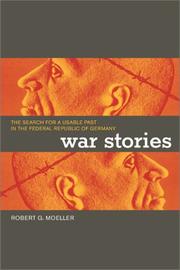| Listing 1 - 4 of 4 |
Sort by
|

ISBN: 0340193883 Year: 1977 Publisher: London : Hodder & Stoughton,
Abstract | Keywords | Export | Availability | Bookmark
 Loading...
Loading...Choose an application
- Reference Manager
- EndNote
- RefWorks (Direct export to RefWorks)
Book
ISBN: 9984055590 Year: 2002 Publisher: Riga : Jumava,
Abstract | Keywords | Export | Availability | Bookmark
 Loading...
Loading...Choose an application
- Reference Manager
- EndNote
- RefWorks (Direct export to RefWorks)
Book
ISBN: 9782226246257 2226246258 Year: 2014 Publisher: Paris: Albin Michel,
Abstract | Keywords | Export | Availability | Bookmark
 Loading...
Loading...Choose an application
- Reference Manager
- EndNote
- RefWorks (Direct export to RefWorks)
At the end of World War II, long before an Allied victory was assured and before the scope of the atrocities orchestrated by Hitler would come into focus or even assume the name of the Holocaust, Allied forces had begun to prepare for its aftermath. Taking cues from the end of the First World War, planners had begun the futile task of preparing themselves for a civilian health crisis that, due in large part to advances in medical science, would never come. The problem that emerged was not widespread disease among Europe's population, as anticipated, but massive displacement among those who had been uprooted from home and country during the war. Displaced Persons, as the refugees would come to be known, were not comprised entirely of Jews. Millions of Latvians, Poles, Ukrainians, and Yugoslavs, in addition to several hundred thousand Germans, were situated in a limbo long overlooked by historians. While many were speedily repatriated, millions of refugees refused to return to countries that were forever changed by the war, a crisis that would take years to resolve and would become the defining legacy of World War II. Indeed many of the postwar questions that haunted the Allied planners still confront us today: How can humanitarian aid be made to work? What levels of immigration can our societies absorb? How can an occupying power restore prosperity to a defeated enemy? Including new documentation in the form of journals, oral histories, and essays by actual DPs unearthed during his research for this illuminating and radical reassessment of history, the author brings to light the extraordinary stories and myriad versions of the war experienced by the refugees and the new United Nations Relief and Rehabilitation Administration that would undertake the responsibility of binding the wounds of an entire continent. Remarkably relevant to conflicts that continue to plague peacekeeping efforts, this work tells the epic story of how millions redefined the notion of home amid painstaking recovery. It is a reassessment of World War II's legacy that evaluates the unique challenges of reconstructing an entire continent of Holocaust survivors and starving refugees, in an account that draws on memoirs, essays, and oral histories to discuss lesser known aspects of the massive postwar relief efforts.
World War, 1939-1945 --- Repatriation --- 2ème guerre mondiale --- Rapatriement --- Refugees --- Forced repatriation --- History --- Réfugiés --- Rapatriement forcé --- Histoire --- Guerre mondiale (1939-1945) --- Influence --- 2ème guerre mondiale --- Réfugiés --- Rapatriement forcé --- Influence. --- Réfugiés. --- World War, 1939-1945 - Refugees --- World War, 1939-1945 - Forced repatriation --- Repatriation - Europe - History - 20th century --- Repatriation - Asia - History - 20th century

ISBN: 0520930312 1597349860 9780520930315 0585390274 9780585390277 0520223268 9780520223264 0520239105 9780520239104 9781597349864 Year: 2001 Publisher: Berkeley University of California Press
Abstract | Keywords | Export | Availability | Bookmark
 Loading...
Loading...Choose an application
- Reference Manager
- EndNote
- RefWorks (Direct export to RefWorks)
Robert G. Moeller powerfully conveys the complicated story of how West Germans recast the recent past after the Second World War. He rejects earlier characterizations of a postwar West Germany dominated by attitudes of ""forgetting"" or silence about the Nazi past.
Forced repatriation. --- German. --- Germans. --- History. --- Political refugees. --- Political refugees-- Germany (West)-- History. --- Population transfers. --- Population transfers - Germans. --- World War, 1939-1945. --- World War, 1939-1945 - Forced repatriation. --- Political refugees --- World War, 1939-1945 --- Population transfers --- Germans --- History - General --- History & Archaeology --- Ethnology --- European War, 1939-1945 --- Second World War, 1939-1945 --- World War 2, 1939-1945 --- World War II, 1939-1945 --- World War Two, 1939-1945 --- WW II (World War, 1939-1945) --- WWII (World War, 1939-1945) --- History, Modern --- Asylum seekers --- Refugees, Political --- Refugees --- History --- Forced repatriation --- Réfugiés politiques --- 2ème guerre mondiale --- Transferts de population --- Allemands --- Histoire --- Rapatriement forcé
| Listing 1 - 4 of 4 |
Sort by
|

 Search
Search Feedback
Feedback About UniCat
About UniCat  Help
Help News
News